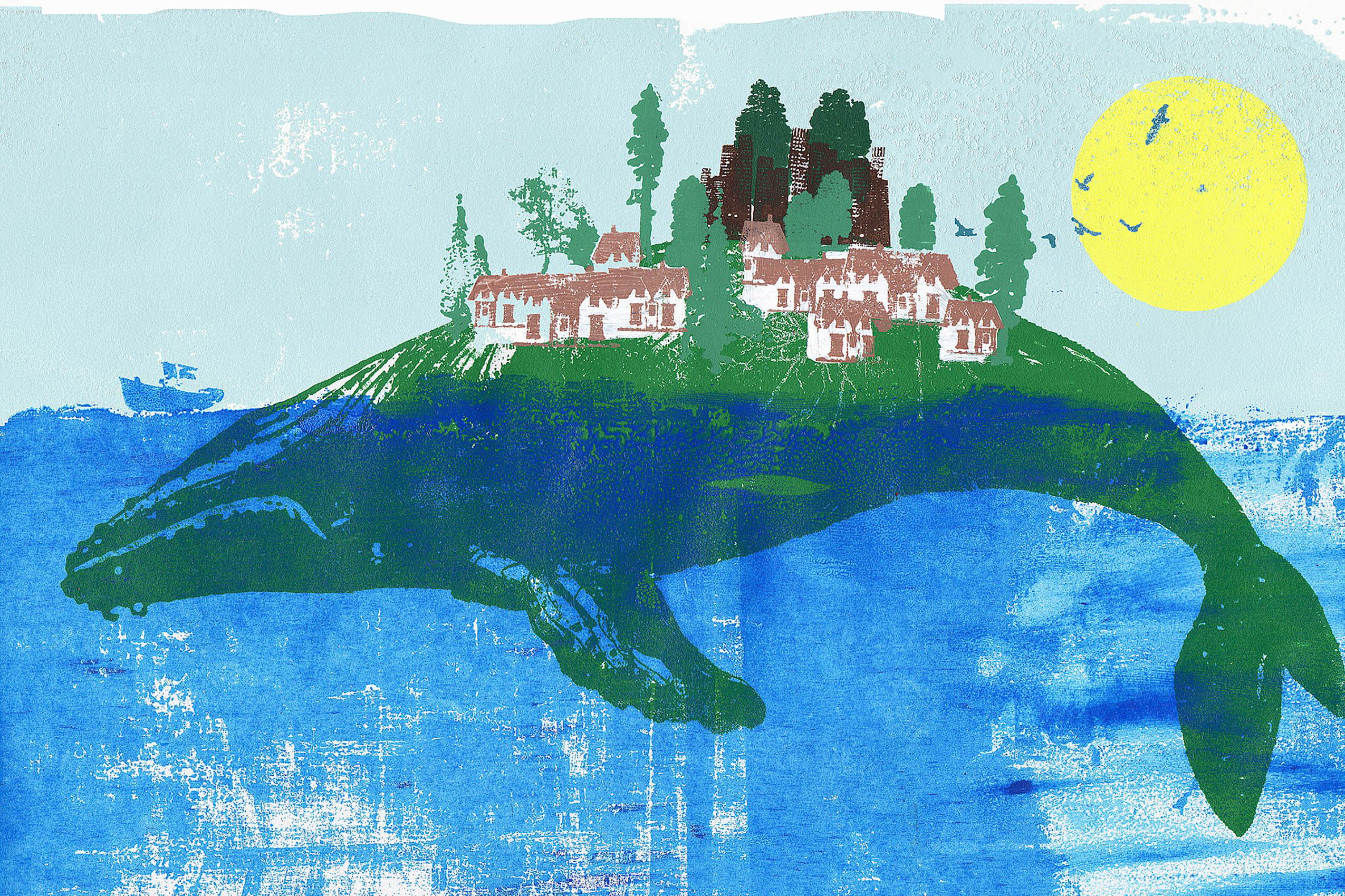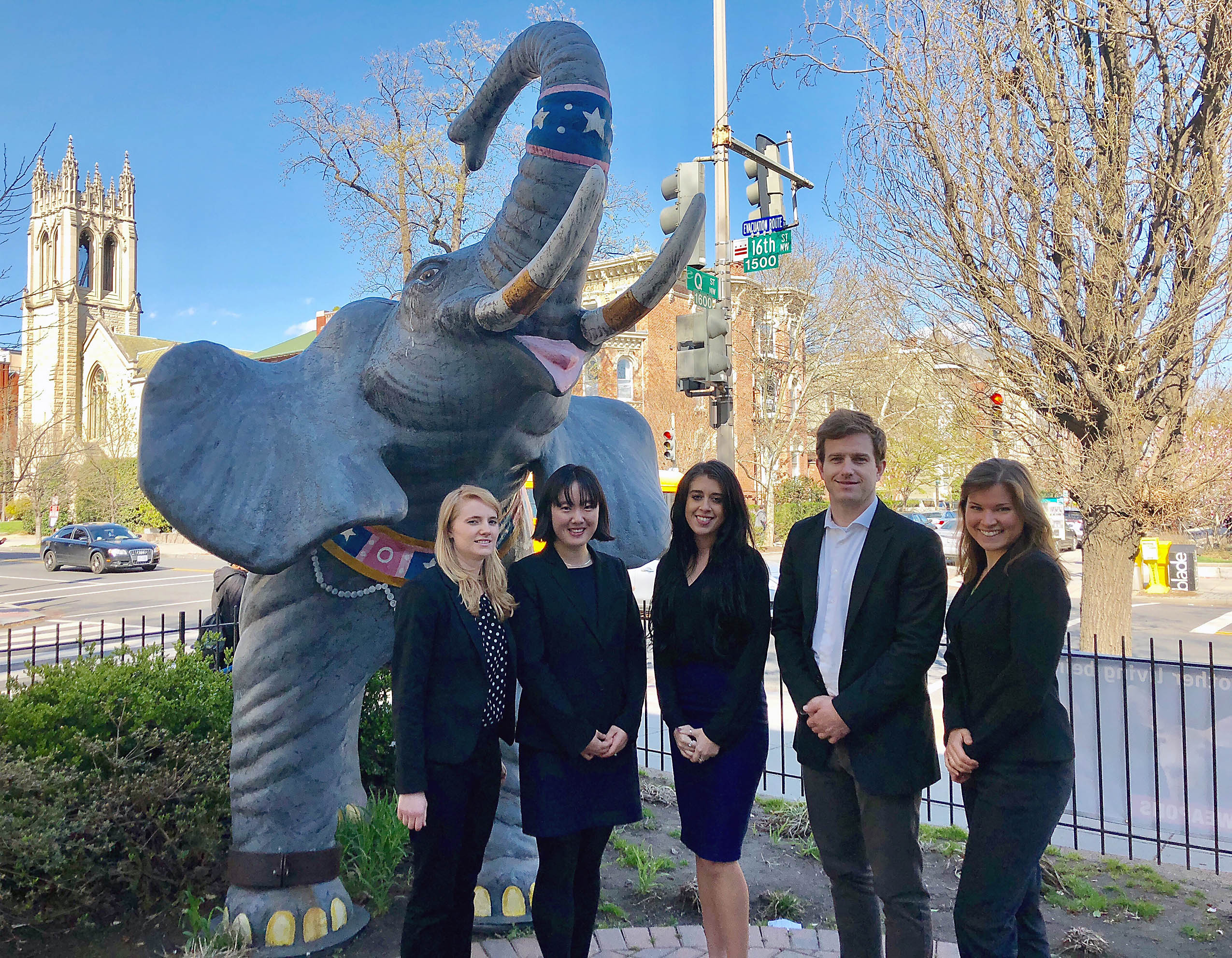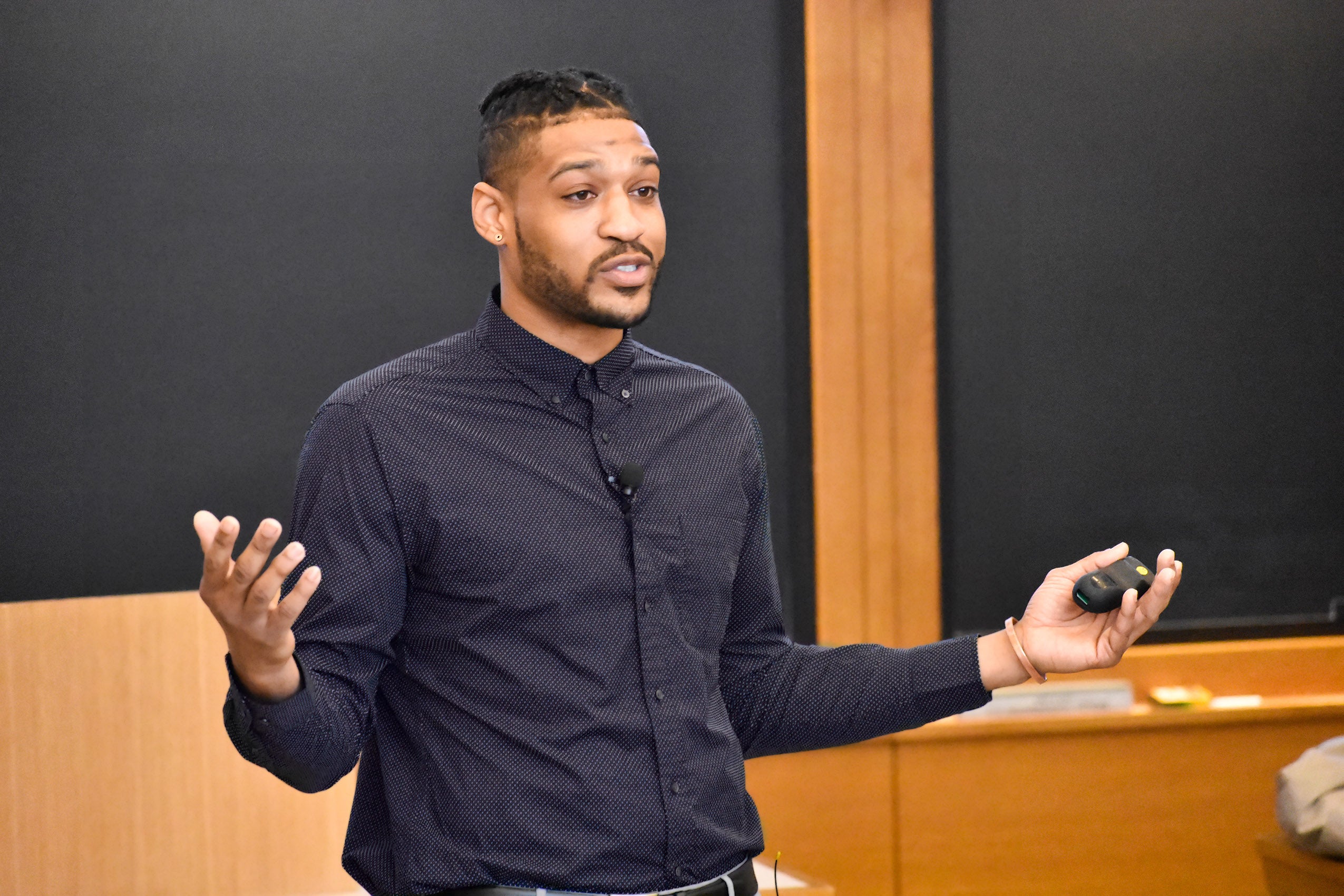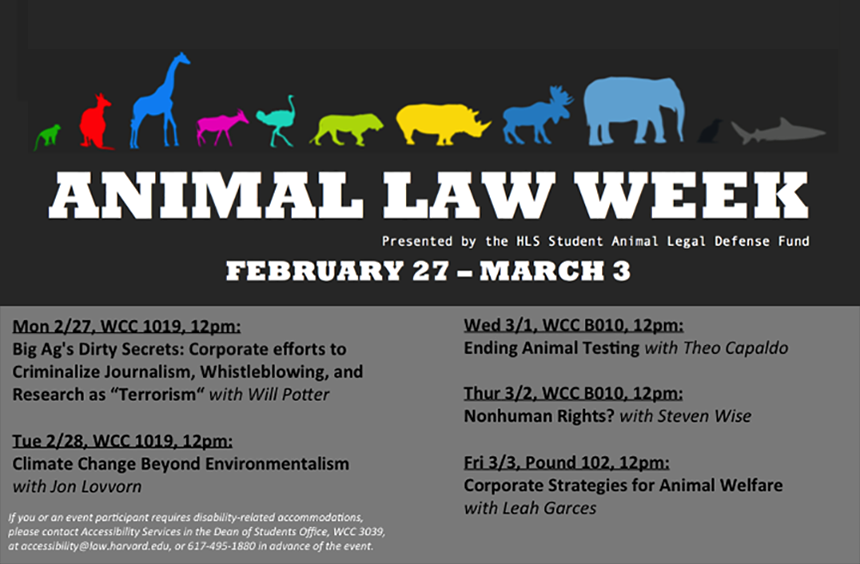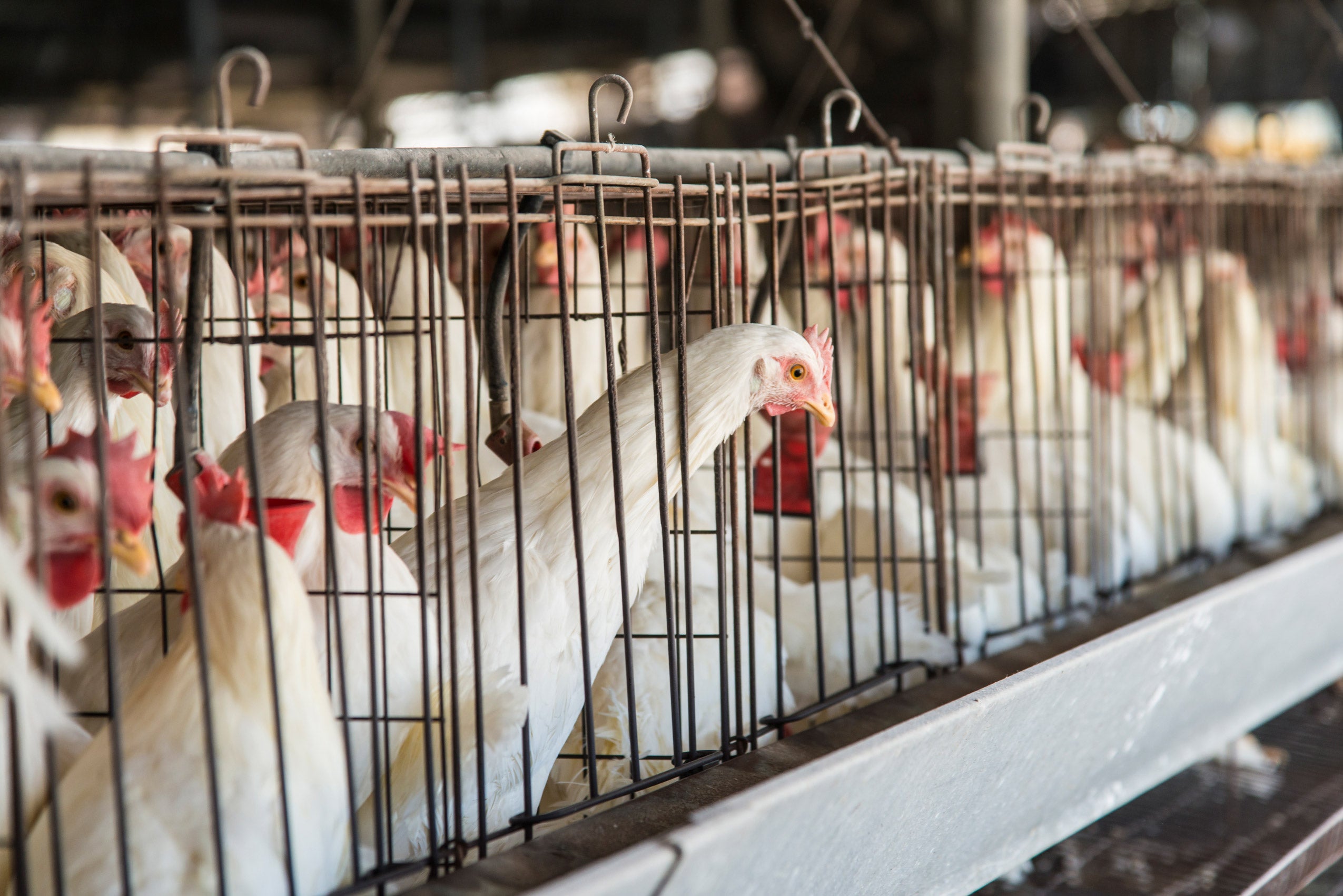People
Chris Green
-
Raising the profile of animal law to match the stakes
December 13, 2018
According to Harvard Law School lecturer Jonathan Lovvorn, saving the planet and its inhabitants from climate catastrophe begins with the world’s most vulnerable population: animals.
-
Third Annual Student Animal Law Trip to Washington D.C.
April 13, 2018
Last week, the Animal Law & Policy Program (ALPP) at Harvard Law School partnered with the HLS Student Animal Legal Defense Fund (SALDF) to organize the third annual “Student Animal Law Trip to Washington D.C.”
-
Fourth annual Animal Law Week held at HLS
March 12, 2018
Animal law advocates from a variety of disciplines and perspectives came together at Harvard Law School for the fourth annual Animal Law Week, an event co-hosted by the Harvard Animal Law & Policy Program and Harvard Law School's Student Animal Legal Defense Fund .
-
Jonathan Lovvorn appointed policy director of the HLS Animal Law and Policy Program
September 15, 2017
On Sept. 5, Harvard Law School Lecturer Jonathan Lovvorn was named the first policy director for the school's Animal Law & Policy Program. Lovvorn, who previously taught Wildlife Law in both the Fall 2015 and Fall 2016 terms, will continue as a lecturer, teaching a new course this fall on Farmed Animal Law & Policy.
-
The intersection of climate change, animal testing, and corporate strategic partnerships were among the issues explored during the third annual Animal Law Week, a series of events hosted at Harvard Law School from Feb. 27-March 3 by HLS’s Student Animal Legal Defense Fund (SALDF) and the Harvard Animal Law and Policy Program.
-
Bills Rise As Pet Vets Get More Corporate
January 30, 2017
What price would you pay to keep the family pet healthy? The sky's the limit, say America's veterinarians, who are providing the increasingly extensive — and expensive — services to meet the growing demand...The key is do your research ahead of time -- before your animal friend needs care. "The worst time to make a decision is when you're in an emotional state and not thinking clearly and are eager to do whatever it takes to save the life of your animal and keep it healthy," said Chris Green, executive director of the Animal Law & Policy Program at Harvard Law School.
-
Putting his money where his mouth is
November 3, 2016
...“The Massachusetts ballot measure is poised to be the single most progressive piece of farmed animal protection legislation ever passed in the United States,” said Christopher Green, executive director of Harvard Law School’s Animal Law & Policy Program. “Having this happen in our backyard as our program gets off the ground has allowed us to analyze the process in the classroom and given our students the opportunity to gain invaluable experience working directly on the campaign.” Thomas has found a welcome partner in the HLS program. With his recent gift of $1 million and a subsequent matching gift of $500,000 to support individual donations of up to $50,000 through December, he is hoping to make farm animals central to animal cruelty prevention. It’s a shared concern...The program’s work reaches well beyond U.S. borders. Its faculty director, Kristen Stilt, is collaborating with Harvard’s South Asia Institute to examine animal agriculture from the Middle East to Asia.
-
Animal-welfare advocate finds partner in growing Law School program
November 2, 2016
With his recent gift of $1 million and a subsequent matching gift of $500,000 to support individual donations of up to $50,000 through December, Charles Thomas is hoping to make farm animals central to animal cruelty prevention.
-
The Case for Treating Animals as Humans
May 27, 2016
Earlier this month, when Louisiana’s New Iberia Research Center, the world’s largest chimpanzee research facility, announced it was moving all 220 of its chimps to a sanctuary in Georgia, it’s a safe bet the news made attorney Steven Wise the happiest man on the planet. That’s because two of the chimps, Hercules and Leo, had been the subjects in an ongoing legal battle about the rights of chimps, a legal case brought by Wise, president of the Nonhuman Rights Project, and the subject of D.A. Pennebaker a Chris Hegedus’s Unlocking the Cage, a documentary out now in New York, followed by a national rollout and an HBO broadcast early next year...“It’s a very novel approach and [Wise] is pushing the envelope,” says Chris Green, Executive Director of Harvard Law School’s Animal Law and Policy Program. “As far as acceptance goes, the jury is still out. And there is concern that the animal protection community might get too far in front of itself that if they find a judge who is too far ahead of public sentiment, there might be some sort of backlash.”
-
Massachusetts’ Battle over “Cage Free” Eggs (audio)
April 20, 2016
In November, voters in Massachusetts will be asked whether the state should ban the sale of eggs, pork products or veal from animals that are too tightly confined within cages. If the ballot measure passes it would have far reaching consequences for the egg industry both in Massachusetts and several other states. It would also mark a big win for the cagefree egg movement. But are cagefree eggs really more humane for animals or healthier for humans? We hear more from environmental journalist Zack Colman, and Chris Green, Executive Director of the Animal Law and Policy Program at Harvard Law School.
-
The Fight for Cage-Free Eggs
April 18, 2016
What should the regulations for animal confinement be? Voters in Massachusetts are poised to decide in a November ballot question whether the state should ban the sale of whole eggs, pork products, or veal from animals that can’t turn around or stretch their limbs within their cages. The prohibition would apply to producers both in and outside the commonwealth, with one of the biggest changes being that eggs sold in the state be “cage-free” when the law goes into effect in 2022, if voters agree to the proposal...“I think especially when you’re dealing with major producers I can’t really see folks taking the risk. The industry is definitely moving on in terms of all the major corporate announcements,” said Chris Green, the executive director of the animal law and policy program at Harvard Law School. But if the Massachusetts ballot initiative is taken up, it’ll be the voters who decide.
-
Delta sued by hunter over exotic animal trophy ban
October 21, 2015
An expert in animal law has flown to the defense of Delta Air Lines after a group of safari hunters sued the airline over its ban on transporting exotic animal hunting trophies...Earlier this year, a petition on Change.org asked Delta, the only U.S. airline serving South Africa directly, to stop transporting exotic animal hunting trophies. The petition was filed by Chris Green, a Delta Diamond Medallion frequent flier who has since become the executive director of the animal law and policy program at Harvard Law School. This week, Green responded to the lawsuit in a letter on the Change.org petition page, writing that public response to the lawsuit “will confirm to Delta Air Lines that it did exactly the right thing by listening to the majority of its customers,” adding that “Delta should be commended for sticking to its principled stance.” The post generated hundreds of comments in support in less than 24 hours.
-
Rhino Killer Sues Airline Because He Wants To Bring His Victims Home
October 20, 2015
A man who paid $350,000 to shoot a black rhino is now suing an airline for refusing to ship his trophy. Corey Knowlton, who won a permit for the hunt from the Dallas Safari Club back in 2014 and made the trip in May 2015, made headlines when CNN decided to go along with him on his hunt for an endangered black rhino in Namibia..."Other than Walter Palmer himself, I cannot think of a less sympathetic plaintiff to challenge Delta's common-sense policy than Corey Knowlton — the Texan who paid to kill one of Africa's rarest black Rhinos," Chris Green, of Harvard Law School, told The Dodo. "No rational airline ever would want to be associated with transporting this endangered animal's butchered body out of Africa just to go hang on some rich American's wall."
